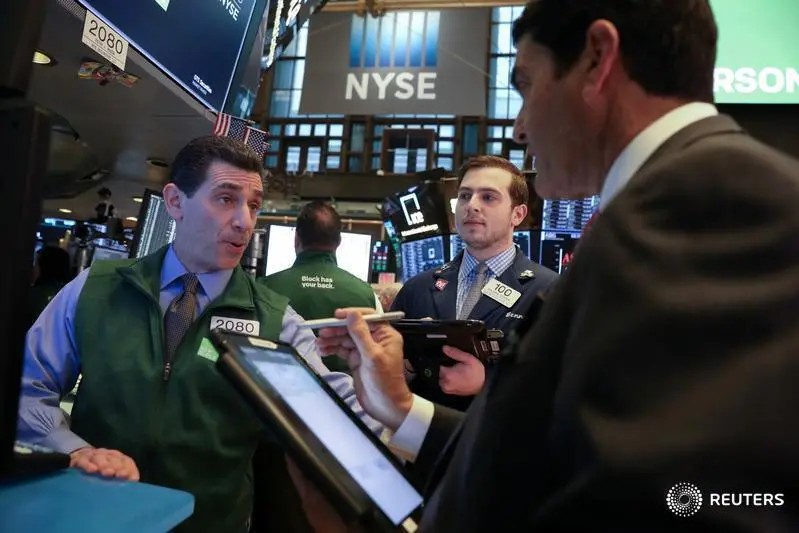PHOTO
NEW YORK - Investors are losing faith that a U.S.-China trade deal could happen soon and are bracing their portfolios for a more prolonged battle that could hamper global growth.
An escalation in recent days in the long-running trade dispute between the world's two biggest economies has stoked fears of a global economic slowdown, causing a sell-off in stocks led by trade-sensitive names and a move into low-risk assets like U.S. Treasuries and gold.
China on Monday said it would impose tariffs ranging from 5% to 25% on 5,140 U.S. products on a target list worth about $60 billion from June 1, striking back after the United States raised duties last week.
Investors have begun to adjust their investment outlooks to factor in more uncertainty on the trade front, at least for the near term.
"You're seeing see a move toward more defensive companies and companies that can still deliver cash flow and dividends," said Quincy Krosby, chief market strategist at Prudential Financial in Newark, New Jersey. These adjustments will continue after Monday, she said. "There's more to this."
Among concerns for stock investors, a collapse of U.S.-China trade discussions could hurt the earnings outlook. Investors expect tariffs could lift corporate costs and lower profit margins, while continued uncertainty surrounding a trade deal will hinder the ability of companies to plan or make capital expenditures.
The sudden change in sentiment could cause some investors to move to cash as well, some strategists said.
"I wouldn't be surprised if some people are raising cash too," said Michael O'Rourke, chief market strategist at JonesTrading in Greenwich, Connecticut. "The market is starting to realize the situation is as bad as it could be."
Optimism that the United States was close to a trade deal with China had been one of the pillars of this year's stock market rally. The S&P 500 returned to record highs in recent weeks and is still up 12.2% since Dec. 31.
Investor expectations that the Federal Reserve will hold off on raising interest rates for now and that the economy will remain stable have supported stocks as well and kept trade relatively calm.
Market volatility has jumped. After months of calm in U.S. stocks, the Cboe Volatility Index .VIX , a widely followed options-based barometer of expected near-term volatility for stocks, last week hit its highest close since January. The index jumped again on Monday.
Within stocks, the hardest hit have been companies that rely heavily on global trade.
Technology, the stock market's leader so far this year, was the day's worst-performing sector, falling 3.7%, while Apple Inc, Boeing Co and Caterpillar Inc were among the S&P 500's biggest drags.
At the same time, the S&P 500 utilities index rose 1.1% and the real estate index was flat.
While the S&P 500 fell 2.4% on Monday in its biggest daily percentage loss since Jan. 3, U.S. Treasury yields dropped to six-week lows.
Ten-year yields fell below those on three-month Treasury bills. A sustained inversion of this part of the yield curve has preceded every U.S. recession in the past 50 years.
In addition to more tariffs, traders are concerned China, the largest foreign U.S. creditor, may dump Treasuries to counter the Trump administration's hardening trade stance.
Such a move would send U.S. borrowing costs soaring, strengthen the yuan and hurt Chinese exporters.
"How low can yields go just became the operative question," said Ian Lyngen, head of U.S. rates strategy at BMO Capital Markets in New York.
Many investors remain hopeful of an eventual trade agreement, and some said the recent selling in stocks is not a big concern.
"I don't think the market is doing anything other than taking a breather," said Jamie Cox, managing partner of Harris Financial Group in Richmond, Virginia. "If there was a situation where there wasn't some type of trade deal, you would see markets much worse, and it would be across the board."
But many are wondering how long investors will tolerate the uncertainty surrounding the talks.
"Investors have wanted to believe the best," said Kristina Hooper, chief global market strategist at Invesco in New York. Yet, "clearly this relationship is deteriorating. It's not what investors had hoped it was on Friday."
(Reporting by Caroline Valetkevitch; additional reporting by Sinead Carew, Richard Leong, Lewis Krauskopf and Chuck Mikolajczak; Editing by Lisa Shumaker) ((caroline.valetkevitch@thomsonreuters.com; +1 646 223 6393; Reuters Messaging: caroline.valetkevitch.thomsonreuters.com@reuters.net))





















